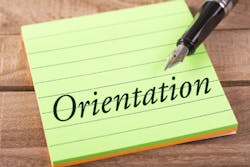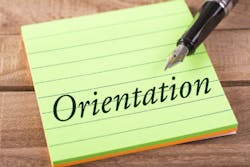The freelancer: 10 tips for temping success in dental hygiene
'Nothing says, “Hey, I’m new,” as awkwardly meddling
with the functions of your chair while the patient is
reclined.'
By Miranda Brooks, RDH, BS
Whether you are a recent dental hygiene grad looking for experience, a new mom looking to come back to the field, or an ambitious dreamer who doesn’t want to be tied down by a typical “9-5 temping,” a more sophisticated term, “freelancing,” is an excellent way to maintain your skills, make a decent paycheck, and give you complete autonomy over your time.
Sometimes venturing to a new office can be a little bit intimidating. So here are 10 tips for temping success to make life little easier and to get these offices to call you back again and again!
- Know before you go! All offices are different, so a phone call with the office manager or dentist prior to your start day is imperative. Make sure to confirm the address with either your temp agency or the office, confirm the time they would like you to arrive (typically 15-30 minutes prior to your first patient), hours expected to work, lunch time, and, most important, hourly rate. If this crucial information is not discussed prior to your arrival, it could make for an unpleasant experience and confusion among both parties.
- Proper PPE. Once you arrive, make sure to ask your office staff to provide you with a lab coat, gloves, and eyewear, if needed. It is OSHA standard that offices are required to provide their hygienists proper PPE during their shift (1). Stand your ground if they give you any pushback and inform them of OSHA standards.
- Don’t just go for good, go for great. Much like having a great rapport with your patients, establishing a great rapport with the office you are working for will get them to call you back again and again. Like any job, you are always on stage. Smile, ask smart yet engaging questions, offer a hand with setting up and breaking down rooms and instruments (not just your own) at the end of the day, and make sure the patients leave having had a pleasant experience with you. Ask if there is anything you can do better next time to make things run more smoothly. You will stand out from the crowd and they will remember you when you go the extra mile.
- Study the office flow. How does the office operate? How does the doctor work? Do they tend to chat extensively with their patients, causing you to run behind, or do they expect you to present all of your findings, expediting patients’ departures as efficiently as possible? Speak with other hygienists if they are available to get their insight. Does the dentist have quirks or pet peeves you can avoid or things you can do to make things run more smoothly?
- All equipment is not created equal. To avoid a rookie mistake, make sure you know how to work the equipment in your room (chair, light, Cavitron machine) prior to your first patient at the new office. Nothing says, “Hey, I’m new” as awkwardly meddling with the functions of your chair while the patient is reclined. Digital versus traditional x-rays? Be sure to ask a dental assistant how the software works or to help you process darkroom x-rays if you think they will cause you run to behind with the appointment.
- Do as the Romans do, but do not compromise care. As a freelance dental hygienist, your job is to provide quality care and to blend into the office, meaning you may have to adjust your way of providing care to fit the office’s needs. However, this does not mean that you compromise the standards of your license or your personal standards. If you observe some issues within the office be sure to constructively bring them up with the proper personnel. If crucial conversations are difficult for you try referencing the book Crucial Conversations: Tools for Talking When Stakes Are High. (3)
- Teamwork makes the dream work. Don’t be afraid to ask for help! Although you will be busy making a great impression on the office, don’t forget about your own comfort and ease. Ask where supplies are located, how the rooms need to be set up, and where there are additional instruments and sharpening stones. Offices don’t expect you to know your way around, and many of them are happy to offer a helping hand. This goes for cranky co-workers as well. Not everyone is keen on “new people” so addressing any attitudes up front in a friendly and constructive way is the best way to make the day go smoothly for everyone. Reminding them that you are a team player is key!
- Finish strong. Congrats, Superstar! Once you made it through your day of patients it is great to ask for feedback and ways you can improve for next time. Many offices will be delighted with your inquiry and may not have much feedback at all. But they will appreciate your willingness to be a team player for their office. Some may be even open to hearing a few suggestions from you! For offices that made your experience extra pleasant (such as if the doctor buys your lunch or the staff coffee) send them a thank-you note a few days after your shift or speak to them personally at the end of the day.
- Be prepared. Depending on the state in which you work, being a temp/freelance hygienist means taking a few precautions when it comes to taxes. Keep track in a log of where you worked, date of employment, name of dentist, and how much you made. Be prepared to owe some taxes if it already hasn’t been deducted from your check. Calibrate with your staffing agency regarding taxes and their policies. A good rule of thumb is to save 30% of the paycheck you receive for government purposes. However, refer to your accountant for the most up-to-date tax information in your state.
- Leave a lasting impression. Be sure to remember everyone’s name or at least do your best to use their names throughout the day. A person’s name is the sweetest sound for anyone to hear (2). Shake their hands (make sure it’s a confident one!), and look them in the eye to tell them how much you appreciate their help during your day. Be sure to leave your personal contact information with the office if the agency doesn’t mind so that they can call you first hand when they need someone again.
Editor note: An earlier version of this article, contained information on "tip" #9 above pertaining to IRS form 1099. Several readers challenged the information, and we have since removed it so we can research it more thoroughly. We apologize for any inconvenience.
References
- United States Department of Labor. (n.d.). Retrieved February 07, 2018, from https://www.osha.gov/pls/oshaweb/owadisp.show_document?p_table=STANDARDS&p_id=9777.
- Carnegie D. (1981). How to win friends and influence people. New York: Simon and Schuster.
- (2016). Crucial conversations: tools for talking when stakes are high by Kerry Patterson, Joseph Grenny, Ron McMillan, and Al Switzer. Idreambooks Inc.


